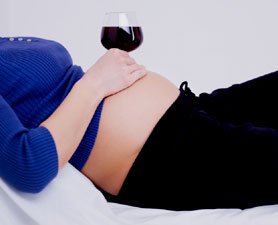
According to new research, drinking a low or moderate level of alcohol in early pregnancy is not linked to developmental problems in five-year-olds.
The Danish research, published in the BJOG journal, suggested one to eight drinks a week was not linked to harm.
Heavy drinking during pregnancy is known to be linked to miscarriage, foetal alcohol syndrome and low birth weight.
The Danish researchers produced five papers on drinking in pregnancy.
More than 1,600 pregnant women took part, recruited at their first antenatal visit. Half were first-time mothers, and just under a third smoked during pregnancy.
They were asked about their alcohol intake.
Low average consumption was defined as one to four per week, moderate as five to eight drinks and high levels as nine or more per week.

Binge drinking, which women were also questioned about, was defined as having five or more drinks on one occasion. Pregnant women who did not drink during pregnancy were included in the research.
The scientists looked at the effects of alcohol on IQ, attention span, executive functions such as planning, organization, and self-control in the five-year-olds.
They found low to moderate weekly drinking in early pregnancy had no significant effect on neurodevelopment of children at the age of five – and neither did binge drinking.
There were no differences in IQ test results in children whose mothers drank one to four units per week or five to eight units per week in pregnancy compared with children of abstaining mothers.
But drinking more than nine drinks per week was associated with lower attention span among the children.
The lead authors of the work, Ulrik Schiøler Kesmodel of Aarhus University and Prof. Erik Lykke Mortensen of the University of Copenhagen, said: “High prenatal exposure to alcohol has consistently been associated with adverse effects on neurodevelopment.
“Areas such as intelligence, attention and executive functions have been found to be particularly vulnerable.
“Our findings show that low to moderate drinking is not associated with adverse effects on the children aged five.”
Patrick O’Brien, a spokesman for the Royal College of Obstetricians and Gynaecologists (RCOG) and a consultant obstetrician in UK said the research was very well designed.
This was because it asked women about their alcohol intake at the time – rather than asking them to look back as past studies have done – and because it followed children for such a ling time and assessed such a range of developmental markers, he said.
The RCOG advises that women abstain from alcohol while pregnant, but if they do decide to drink evidence suggests “one or two units, once or twice a week, is acceptable after 12 weeks of pregnancy”.
Dr. Patrick O’Brien said: “These findings suggest low to moderate drinking has no significant effect on children aged five. However, this does not mean that women can use this as an excuse to indulge in more than the recommended amount in the UK.
“This evidence suggests that the UK guidance is erring on the side of caution – but that’s sensible in pregnancy.”
Women are advised to talk to their midwife or doctor if they have any concerns about the amount of alcohol they are drinking in pregnancy.